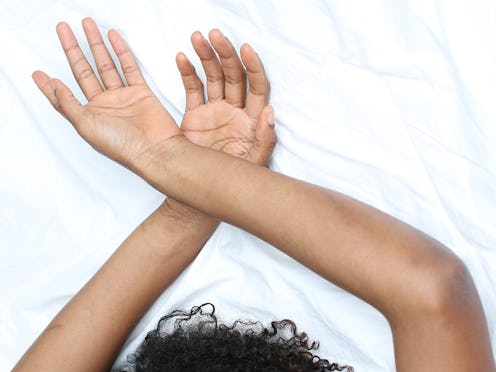Life
Depression Can Be Literally, Physically Painful, According To A New Study

If you’ve ever felt the overwhelming sadness, hopelessness, or pessimism that depression can cause, then no one needs to tell you that depression is psychologically and emotionally painful. But new research says that depression can be literally, physically painful as well.
In order to better understand why physical symptoms might happen when you feel depressed, researchers at Columbia University’s Department of Psychiatry performed two clinical trials over a period of several years. Study subjects were all managing chronic depression, and were prescribed either antidepressant medication or a placebo. Over the course of the study, researchers collected data from over 200 MRI scans, and assessed brain changes associated with both depression and the effects of treatment. According to study author Dr. David Hellerstein M.D., writing for Psychology Today, the connection between mental health and physical symptoms is something that therapists often see, but clinicians haven’t always understood how emotional and physical pain may be linked.
By analyzing nerve cell activity is the brains of study subjects, the study’s authors observed a series of connections “from the cortex to the lower brain centers.” This network of nerve activity is central to pain processing, but has never been studied in relationship to depression before, Dr. Hellerstein wrote.
“Suffice it to say, we were all surprised by the findings,” wrote Dr. Hellerstein. “The brain network that showed changes with antidepressant medicine — but not with the placebo — involved the pain network. The pain network has been identified when studying people’s responses to physical pain, and consists of a series of connections from the cortex to the lower brain centers. This network is central to processing pain, but it has never been previously connected to depression.”
It’s known that depression symptoms can include physical signs like headaches, fatigue, changes in appetite, or “pain for which no other cause can be diagnosed,” the Anxiety and Depression Association of America (ADAA) says. The Mayo Clinic writes that “unexplained physical problems,” such as backaches, are common with depression, but, until now, researchers haven’t fully understood the brain mechanisms at play, according to Dr. Hellerstein.
The Colombia researchers noted that treatment with antidepressant medications relieved both psychological and physical symptoms, while treatment with the placebo had no effect on pain in study subjects. Moreover, as the psychological and emotional symptoms of depression improved, the less active the pain network activity was. This suggests that these pain network pathways may be acutely sensitive to how severe someone’s depression might be overall, Dr. Hellerstein wrote. These findings may also help researchers better understand how antidepressants work in the brain, he said.
If you find that your depression symptoms include physical aches and pains, know that there may be real reasons for this. When it comes to getting treatment that can help, it’s important to find a doctor or therapist who can validate your concerns. While there’s no one-size-fits all formula when it comes to depression treatment plans, getting help from supportive providers can make a huge difference in how well you feel — in both body and mind — in the long run.
If you or someone you know is seeking help for mental health concerns, visit the National Alliance on Mental Health (NAMI) website, or call 1-800-950-NAMI(6264). For confidential treatment referrals, visit the Substance Abuse and Mental Health Services Administration (SAMHSA) website, or call the National Helpline at 1-800-662-HELP(4357). In an emergency, contact the National Suicide Prevention Lifeline at 1-800-273-TALK(8255) or call 911.